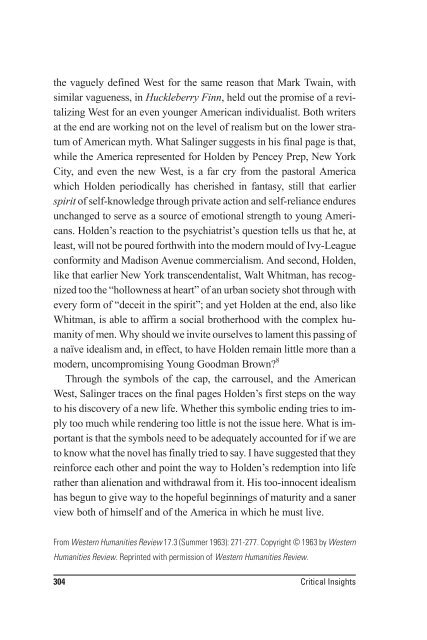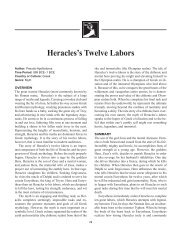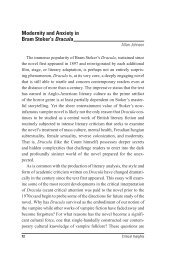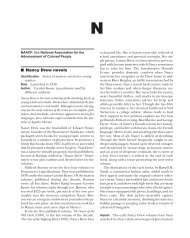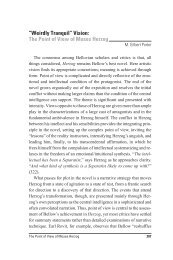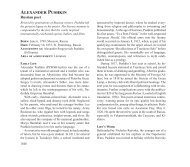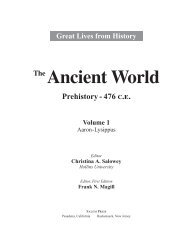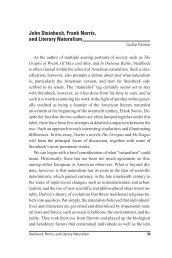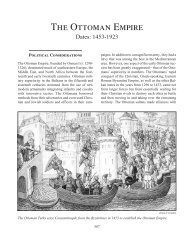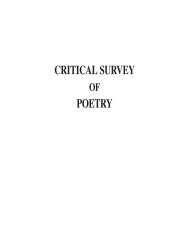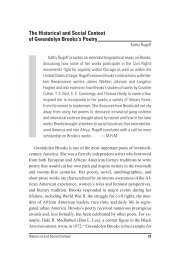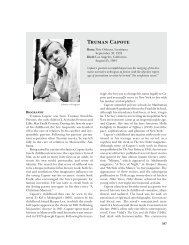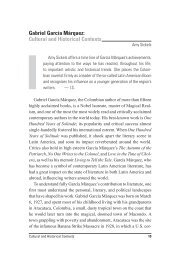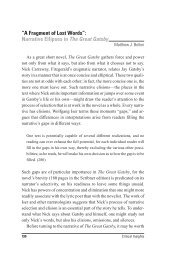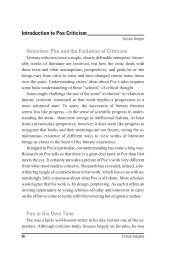Catcher in the Rye.vp - Salem Press
Catcher in the Rye.vp - Salem Press
Catcher in the Rye.vp - Salem Press
Create successful ePaper yourself
Turn your PDF publications into a flip-book with our unique Google optimized e-Paper software.
<strong>the</strong> vaguely def<strong>in</strong>ed West for <strong>the</strong> same reason that Mark Twa<strong>in</strong>, with<br />
similar vagueness, <strong>in</strong> Huckleberry F<strong>in</strong>n, held out <strong>the</strong> promise of a revitaliz<strong>in</strong>g<br />
West for an even younger American <strong>in</strong>dividualist. Both writers<br />
at <strong>the</strong> end are work<strong>in</strong>g not on <strong>the</strong> level of realism but on <strong>the</strong> lower stratum<br />
of American myth. What Sal<strong>in</strong>ger suggests <strong>in</strong> his f<strong>in</strong>al page is that,<br />
while <strong>the</strong> America represented for Holden by Pencey Prep, New York<br />
City, and even <strong>the</strong> new West, is a far cry from <strong>the</strong> pastoral America<br />
which Holden periodically has cherished <strong>in</strong> fantasy, still that earlier<br />
spirit of self-knowledge through private action and self-reliance endures<br />
unchanged to serve as a source of emotional strength to young Americans.<br />
Holden’s reaction to <strong>the</strong> psychiatrist’s question tells us that he, at<br />
least, will not be poured forthwith <strong>in</strong>to <strong>the</strong> modern mould of Ivy-League<br />
conformity and Madison Avenue commercialism. And second, Holden,<br />
like that earlier New York transcendentalist, Walt Whitman, has recognized<br />
too <strong>the</strong> “hollowness at heart” of an urban society shot through with<br />
every form of “deceit <strong>in</strong> <strong>the</strong> spirit”; and yet Holden at <strong>the</strong> end, also like<br />
Whitman, is able to affirm a social bro<strong>the</strong>rhood with <strong>the</strong> complex humanity<br />
of men. Why should we <strong>in</strong>vite ourselves to lament this pass<strong>in</strong>g of<br />
a naïve idealism and, <strong>in</strong> effect, to have Holden rema<strong>in</strong> little more than a<br />
modern, uncompromis<strong>in</strong>g Young Goodman Brown? 8<br />
Through <strong>the</strong> symbols of <strong>the</strong> cap, <strong>the</strong> carrousel, and <strong>the</strong> American<br />
West, Sal<strong>in</strong>ger traces on <strong>the</strong> f<strong>in</strong>al pages Holden’s first steps on <strong>the</strong> way<br />
to his discovery of a new life. Whe<strong>the</strong>r this symbolic end<strong>in</strong>g tries to imply<br />
too much while render<strong>in</strong>g too little is not <strong>the</strong> issue here. What is important<br />
is that <strong>the</strong> symbols need to be adequately accounted for if we are<br />
to know what <strong>the</strong> novel has f<strong>in</strong>ally tried to say. I have suggested that <strong>the</strong>y<br />
re<strong>in</strong>force each o<strong>the</strong>r and po<strong>in</strong>t <strong>the</strong> way to Holden’s redemption <strong>in</strong>to life<br />
ra<strong>the</strong>r than alienation and withdrawal from it. His too-<strong>in</strong>nocent idealism<br />
has begun to give way to <strong>the</strong> hopeful beg<strong>in</strong>n<strong>in</strong>gs of maturity and a saner<br />
view both of himself and of <strong>the</strong> America <strong>in</strong> which he must live.<br />
From Western Humanities Review 17.3 (Summer 1963): 271-277. Copyright © 1963 by Western<br />
Humanities Review. Repr<strong>in</strong>ted with permission of Western Humanities Review.<br />
304 Critical Insights


